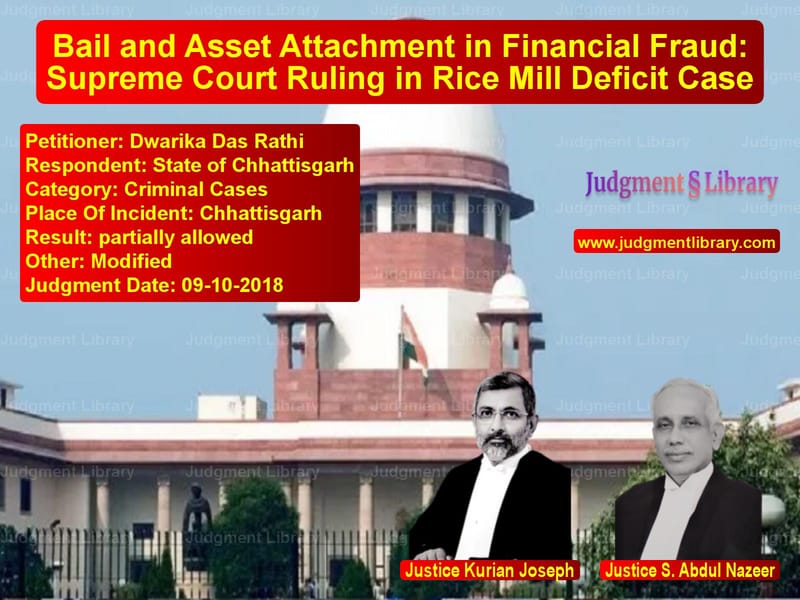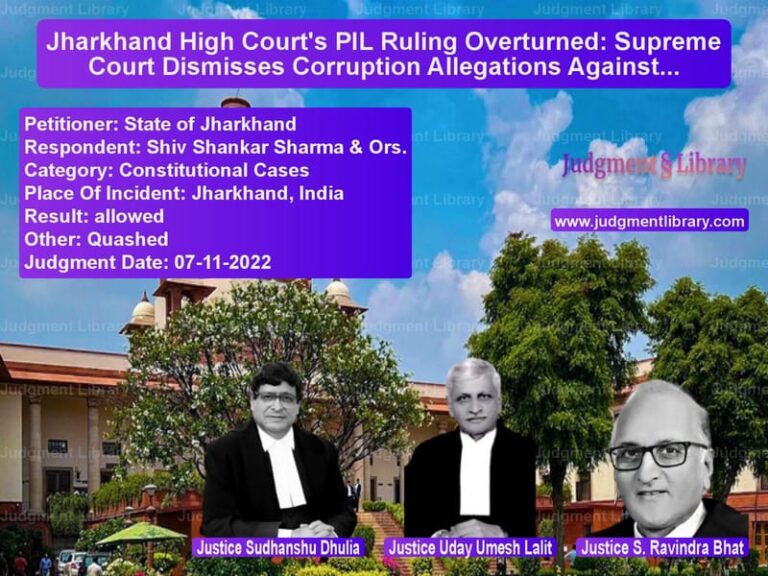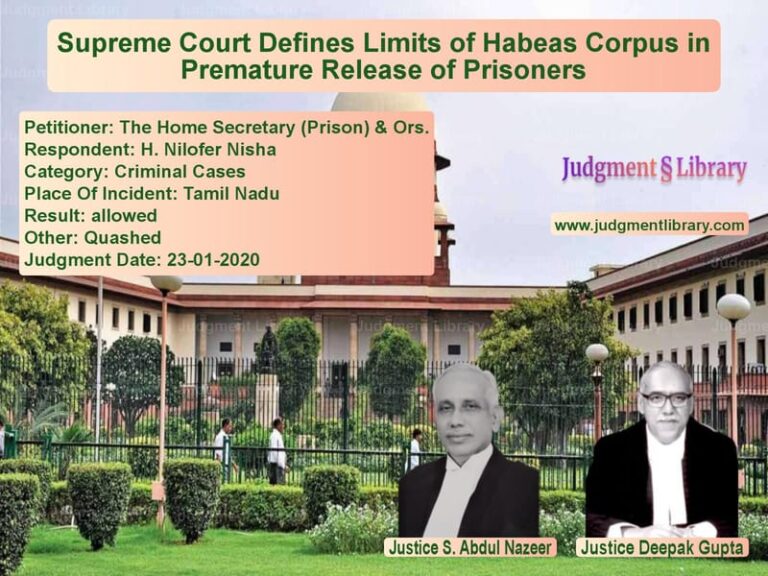Bail and Asset Attachment in Financial Fraud: Supreme Court Ruling in Rice Mill Deficit Case
The case of Dwarika Das Rathi vs. State of Chhattisgarh is a critical judgment regarding anticipatory bail, financial liability in economic offenses, and the attachment of assets to recover state dues. The Supreme Court of India, in its judgment on October 9, 2018, examined whether anticipatory bail can be granted when a financial fraud involves a substantial monetary deficit and whether the state has the right to attach the accused’s property to recover losses.
The case revolves around an economic offense where the appellant, a rice mill owner, failed to return the requisite quantity of rice after custom milling. The total deficit was estimated at Rs. 2,71,34,937. The ruling by the Supreme Court clarifies the application of bail laws in economic offenses and upholds the power of the state to recover financial losses by attaching the accused’s properties.
Background of the Case
The case stems from Crime No. 123 of 2016, registered at Police Station Vidhan Sabha, Raipur, Chhattisgarh. The appellant, Dwarika Das Rathi, was charged under:
- Section 420 of the Indian Penal Code (IPC) – Cheating
- Section 409 of the IPC – Criminal breach of trust
- Sections 3 and 7 of the Essential Commodities Act – Violation of government policies on food distribution
The charges stemmed from allegations that the appellant, a rice mill owner, had taken paddy for milling but did not return the required quantity of rice to the government.
Arguments by the Appellant (Dwarika Das Rathi)
- The appellant contended that he was unable to deposit the money due to financial hardship.
- He claimed that the government had wrongly calculated the deficit.
- He was willing to cooperate with the investigation and requested protection from arrest under Section 438 CrPC.
- He sought alternative means, such as installment payments, instead of property attachment.
Arguments by the Respondent (State of Chhattisgarh)
- The prosecution contended that the appellant had caused a huge financial loss to the state.
- He failed to return the required amount of rice, despite multiple reminders.
- The state had the right to attach and sell his properties to recover the deficit.
- His financial incapacity should not absolve him of liability.
Supreme Court’s Observations and Judgment
The Supreme Court carefully examined the matter in the context of financial fraud, bail provisions, and asset recovery.
Interim Protection and Bail Conditions
- The Court had earlier granted the appellant interim protection on January 25, 2017, with a condition to deposit Rs. 2,71,34,937 within three weeks.
- Since he failed to do so, the Court directed the attachment of his immovable properties for recovery.
- On May 8, 2018, the Court directed that any compensation due to the appellant for land acquisition be used to pay the state.
Final Judgment
- The Supreme Court ruled that the trial court should take a final decision on the quantum of liability at the conclusion of the trial.
- The attachment of immovable properties and bank accounts to cover the deficit was upheld.
- The Court clarified that the appellant must seek regular bail from the trial court if summoned after the investigation report.
The Court ruled:
“The Investigating Officer is free to continue with his investigation. The State is permitted to attach all the immovable properties of the appellant and the bank accounts so as to cover up the deficit of the deposit, as directed by this Court.”
Impact of the Judgment
The ruling establishes key principles in cases involving economic fraud:
- Courts can impose strict conditions, such as property attachment, to secure financial claims against the accused.
- Anticipatory bail does not shield an accused from financial liability.
- The government has the right to attach assets when state funds are misappropriated.
- Accused persons must demonstrate financial responsibility to seek bail relief.
Conclusion
The Supreme Court’s judgment in Dwarika Das Rathi vs. State of Chhattisgarh is a strong precedent in financial fraud cases. It ensures that economic offenders cannot escape liability by merely securing bail. The ruling reinforces the power of the state to recover its dues while ensuring that due process is followed in criminal proceedings.
Petitioner Name: Dwarika Das Rathi.Respondent Name: State of Chhattisgarh.Judgment By: Justice Kurian Joseph, Justice S. Abdul Nazeer.Place Of Incident: Chhattisgarh.Judgment Date: 09-10-2018.
Don’t miss out on the full details! Download the complete judgment in PDF format below and gain valuable insights instantly!
Download Judgment: Dwarika Das Rathi vs State of Chhattisgar Supreme Court of India Judgment Dated 09-10-2018.pdf
Direct Downlaod Judgment: Direct downlaod this Judgment
See all petitions in Bail and Anticipatory Bail
See all petitions in Fraud and Forgery
See all petitions in Judgment by Kurian Joseph
See all petitions in Judgment by S. Abdul Nazeer
See all petitions in partially allowed
See all petitions in Modified
See all petitions in supreme court of India judgments October 2018
See all petitions in 2018 judgments
See all posts in Criminal Cases Category
See all allowed petitions in Criminal Cases Category
See all Dismissed petitions in Criminal Cases Category
See all partially allowed petitions in Criminal Cases Category







